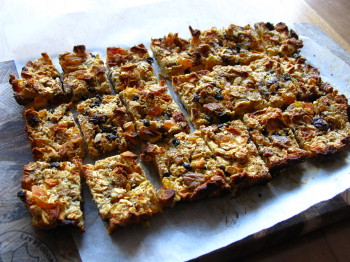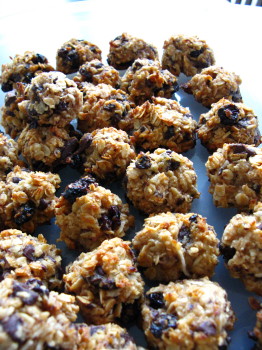A recent work trip to Switzerland provided the ideal opportunity to conduct some sideline research on something which the Swiss can fairly claim authority: muesli. I set out to try a different kind of bircher muesli every day, and very nearly succeeded: I was given some on the aeroplane, then I had some from the local bakery, a few different kinds from the corner supermarket, and some from the hotel breakfast bar too. All very tasty, but I can report that the highlights were one with stewed rhubarb, and another made with a strawberry yoghurt base.
Another branch of my muesli research centred on the muesli bar. This was something I had already been preoccupied with back home, in an attempt to find something tasty, easy to make and healthy for my son. Many of the supermarket-bought varieties here seem to contain about 1/3 of their weight in sugar, which is far from ideal. Unfortunately, my Swiss supermarket research yielded much the same results (except that they did also have my favourite flavour – pear!).
So when I returned I resolved to have another go at home-made. These turned out a tasty, chewy mix – which I loved and so far my son seems to take to as well – but I think the key to this recipe lies in your mixture of dried fruit. I used 1/3 dried apple, 1/3 turkish dried apricot, 1/3 dried figs, and the end result turned out to have a dominant apricot flavour. I guess the end result was only very vaguely Swiss, so maybe I should just try to hunt down some dried pear to make a healthy version of those delicious pear muesli bars…

Rustic Muesli-Bar-Bites
1 cup rolled oats
1/2 cup dessicated coconut
2 weetbix, crushed (or 1/2 cup wheatgerm)
1/2 cup wholemeal self-raising flour
400g mixed dried fruit, chopped (see notes above)
1/2 cup currants or sultanas
2 eggs
1/2 cup fruit juice
1/4 cup honey
1/4 cup milk
Preheat oven to 180C, and line 2 trays (25cm x 17cm) with baking paper.
In a large bowl, combine the dry ingredients, including the dried fruit. Stir to mix well.
In a small bowl, stir together the wet ingredients. (Don’t worry if the honey doesn’t mix through properly at this point.)
Tip the wet ingredients into the dry, and stir very well to mix through. Press the mixture into the baking trays, making the tops as smooth as you can.
Bake for 35-35 minutes, until the tops are just golden and the mixture has shrunken away slightly from the sides.
Cool in the tins until the bars are cool to the touch, then cut into whatever size bars or squares you like.
Yield: Depends on the size of your bars, but I got out 42 bites from a batch.

